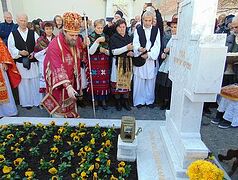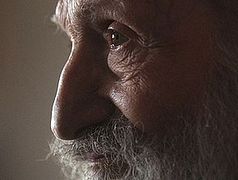Part 1. “I Should Kill You—You Know Communism Better Than Me!”
Part 2. “Comrade Major, This is a Monk, Not a Monarch!”
Part 3. “Father, Go Hang Yourself!” Or the Beginning of His Ministry in Kosovo
We continue to publish the recollections of Archimandrite Jovan (Radosavlević), a friend, companion, and co-struggler of the Serbian Patriarch Pavle. Fr. Jovan published his recollections in the book Memories, printed at Rača Monastery in 2018. Several episodes from this book—mournful and joyful, sad and smile-evoking—tell about the life of the Serbian Church and Serbian people at the end of the twentieth century, before and during the open war in 1999. We offer them today.
Business as usual in Kosovo
One day I went to see Vladyka Pavle off at the bus station in Prizren. As soon as we got outside the fence, a fairly large group of young Albanians, fifteen to seventeen years old, came running over to us. They stood in front of Vladyka Pavle and started making faces, shouting, literally barking at him, and swearing. Vladyka said sadly, “Your grandfathers were the same way.” We went further, to the bridge through Bistrica, where we found the same crazy, raging group of Albanian girls, making the same faces, barking and swearing. Vladyka Pavle walked past them, not so much in anger as in sorrow for their spiritual state—both of themselves and of their parents. Later it became clear that they taught their children, from the very youngest to the young adults, to behave this way towards all adult Serbs, especially the bishops and priests.
What man is good?
During conversations with Vladyka Pavle, sometimes someone would say about him: “This is a good man!” Vladyka would ask:
“What does it mean to be a ‘good man,’ in your opinion? Good because he’s young, handsome, able to conduct a conversation, smiles in time when he hears a joke, sings well, is good-natured, and so on? But you don’t really know his soul, his spiritual properties!”
What does Christ say to the rich young man who called Him “good teacher?” Christ answered: Why callest thou Me good? there is none good but one, that is, God (Mt. 19:17). First of all, the young man should understand that all people are sinners, and a sinful man cannot be good in the fullest sense of the word. After all, He looked at Christ as a teacher, an ordinary person, but not as the Son of God. That is why the Lord answers him this way. God is the perfect good, the source of good. Man is given the task of being the image of God, of being perfect as God is perfect. And a man should strive to understand this with all his might and labor over the image of God within himself—like the saints. Then we can say that he’s a good man, considered Vladyka Pavle.
When Vladyka Pavle lost the battle
We had a stove in the kitchen in Prizren and Vladyka Pavle and the brothers would often cook on it. Everyone but Vladyka was displeased with it; the stove smoked so much that it burned your eyes. To the others’ complaints and requests to finally replace this monster with a good stove, there was always one answer: “Go away, you goofs. I like it.” Our torment ended with the arrival of Sister Agitsa, Vladyka Pavle’s relative on his mother’s side, who raised him in his early childhood. She had unquestionable authority with him. And so, she came to Prizren from Belgrade, tried to cook lunch on the unfortunate stove, began to cry from the smoke, and went to see Vladyka Pavle.
“Brother,” as she always called him, “this stove of yours is no good—buy a new one.”
“What for? It suits me so far,” said Vladyka.
“It ‘suits’ him! Have you seen this smoke?! No, look: It’s all cracked and broken; it looks like it’s about to fall apart. And how much wood is wasted heating it up! Enough already, buy a new one.”
“Well, then, of course, Sister Agitsa. As you say,” Bishop Pavle agreed humbly.
A few days later, there was a new stove in the kitchen—strong, economical, hot. We were ready to carry Sister Agitsa in our arms.
Give me the bread!
One day I was sitting in the trapeza eating bread. It was good. I ate all the bread but left the burnt crust, putting it on the table. Vladyka Pavle, still a hierodeacon then, asked:
“Why’d you leave the crust?”
“It’s burnt.”
“Give it to me!” he said, taking the crust and eating it calmly. Thus the future Patriarch taught and shamed me without a single word.
He had a habit of always sharing with someone at trapeza. Bread, apples, pears, nuts, tomatoes, etc.—he always offered something to those he was eating with. He didn’t like it when food was treated carelessly, but he never allowed overeating either; he demanded good measure in everything. Indeed, his measure was not for everyone, because he ate very little…
Spiritual “optimization” and opposition to it
In the mid-1960s, there was a wonderful young priest, Fr. George Adjancić, in the village of Velika Hoča. Everyone loved him very much. He was sincere, fervent, and homegrown. But during a “friendly” conversation at the table, the communists there (alas, Serbs!) made an accusation against him for denegrating the authorities and the existing state structure and handed him over to the authorities in Peć, which consisted entirely of Albanians then. George was sent to prison, where he was terribly tortured, spitting blood from the torture. He was released after some time, but he died from tuberculosis, leaving behind a wife and five children. Vladyka Pavle took care of the expenses for the education of the priest’s children.
When I went to serve in that village once, the communists also tried to arrange some kind of provocation: They demanded that I not dare serve panikhidas and funerals in the local cemetery. I told them their demands contradict the constitution, which guarantees freedom of religion. It didn’t work—they continued to insist that the services stop. The people gathered there couldn’t bear it. They said, “They killed one good priest, and now you want to kill another? You want us to live like cattle—without a priest, services, or God?!” They took up hoes, and had these “activists” not retreated, everything could have ended sadly for them.
The unfinished war
That evening, at 8:00 PM on March 24, 1999, the bombardment began. Enemy aircraft flew from the Mediterranean, Ionian, and Adriatic Seas, and from American aircraft carrier and military bases in Italy, Croatia, and Hungary. First they bombed Belgrade, Novi Sad, Pristina, Prizren, Niš, Čačak, and other cities and villages. In April, I was in Novi Sad and I remember how the bridge over the Danube was destroyed: Early in the morning, two rockets hit both ends of the bridge, and it tipped over and crumpled into the river. The explosion blew out all the windows in the city. We got together and went to the morning service in the cathedral. When we returned from Liturgy, we found fragments of bombs and shells in the diocesan courtyard.
From the very first day, with the approval of Patriarch Pavle, I began to keep a journal, for the edification of our descendants. Later there was a book based on it, Journal Under Bombs. At that time, we believed that not only Kosovo and Metohije would be torn away from Serbia, but also Vojvodina, the northern part: Croatian Ustaše and Hungarians would be sent there, and then the Serbs would again see their real “international alliance”… In those days, I carried two radios with me to listen to the news where the bombing was taking place, and I recorded data about the destruction, the loss of life, the expulsion of people from the land.
 With Patriarch Alexei II of Moscow and All Rus’, Belgrade, 1999
With Patriarch Alexei II of Moscow and All Rus’, Belgrade, 1999
I gratefully remember how Patriarch Pavle and I served Liturgy in Belgrade under the bombardment together with Patriarch Alexei II of Moscow and All Rus’—it was true fraternal support and assistance.
“Brothers and sisters, we must always follow the path of truth and honesty, faith and virtue, Christian bravery, without hatred and thirst for revenge against anyone,” Patriarch Pavle said. “Our business is to be humble before God in penitential prayer and honest and open to people. A man can’t choose the place where he is born or the people he belongs to—it’s in God’s power,” Vladyka said especially often during the war in Kosovo, declared and undeclared.
Everything that was created in Kosovo and Metohije, in this spiritual homeland of the Serbs, back in the Middle Ages and later in modern times, godless human malice seeks to destroy. And we have no other choice but to follow the example of Patriarch Pavle—to pray to Almighty God for protection, for liberation from slavery, for His judgment over our enemies, for the transfiguration of hatred for the Orthodox Serbs into reasonableness and a normal attitude towards our people. It may seem impossible, but God is all-powerful and can touch the heart of even the most terrible criminal—this is our hope.





